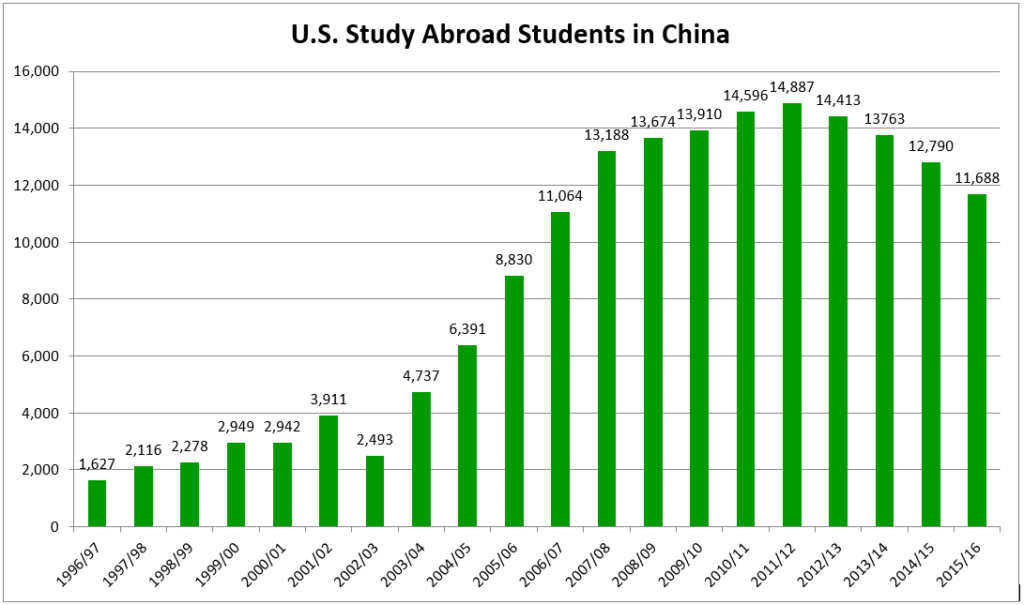China is continuing to decline as a destination for U.S. study-abroad students, slipping from fifth place to sixth (behind Britain, Spain, Italy, France, and Germany; with Ireland, Australia, Costa Rica, and Japan completing the top ten).
This likely indicates that the craze for learning Mandarin has already peaked. Greater awareness of the unhealthy levels of pollution in China may also be a factor.

Note: The dip in the 2002–2003 school year was a result of worries about the outbreak of SARS.
Meanwhile, almost all other parts of East Asia saw increases in 2015–2016 over 2014–2015:
| Destination | Students in 2014-15 | Students in 2015-16 | % Change |
|---|---|---|---|
| China | 12,790 | 11,688 | -8.6 |
| Hong Kong | 1,508 | 1,612 | 6.9 |
| Japan | 6,053 | 7,145 | 18.0 |
| Macau | 3 | 4 | 33.3 |
| Mongolia | 71 | 71 | 0.0 |
| South Korea | 3,520 | 3,622 | 2.9 |
| Taiwan | 880 | 980 | 11.4 |
sources:
- Open Doors Fact Sheet: China, Open Doors
- Destinations of U.S. Study Abroad Students, 2014/15 & 2015/16, Open Doors
Additional reading:
- China down slightly as destination for U.S. study abroad students, Pinyin News, October 13, 2015
- China and U.S. study-abroad programs, Pinyin News, January 30, 2012
- China and U.S. study abroad programs, Pinyin News, February 7, 2011
- China and U.S. study abroad programs: update, Pinyin News, January 8, 2010
- China and U.S. study abroad programs, Pinyin News, November 23, 2008
- US students abroad, Pinyin News, Tuesday, November 15, 2005

This change likely reflects the end of the honey moon period, during which it was assumed that knowing Mandarin would be of immense benefit in the career market. The huge jump in learning Mandarin was not driven by a love for the language or culture, but for utilitarian reasons, and these reasons have largely proved to be illusions, since Chinese companies have shown that they have no issues with conducting business in English, while international companies also prefer to hire local Chinese who speak both Mandarin and English, rather than Americans who can do the same.
It probably also reflects a concern with China’s economy, which has slowed in recent years and is becoming less friendly to international businesses.
This article goes into more detail:
https://www.reuters.com/article/us-china-usa-students/u-s-students-losing-interest-in-china-as-dream-jobs-prove-elusive-idUSKBN0M82MU20150312
“For U.S. students, China’s notorious pollution is a concern. Job opportunities are another. As multinationals in China hire mostly local Chinese, a growing percentage of whom have studied abroad, they have less need for foreigners who speak Chinese.
“I came to China thinking I could learn Chinese and get a high paying job. I learned very quickly that was not the case,” said Ian Weissgerber, a 25-year-old American graduate student in China. “A lot of Chinese can speak English just as well as I can, and Chinese is their native tongue too.”
…
“It really comes down to money,” says John Thomson, a veteran China study abroad executive. “You’re taking yourself out of the job market for a couple years to study an extremely difficult language with no guaranteed pay-off at the end.””
Pingback: More Americans studying in Japan | Pinyin News